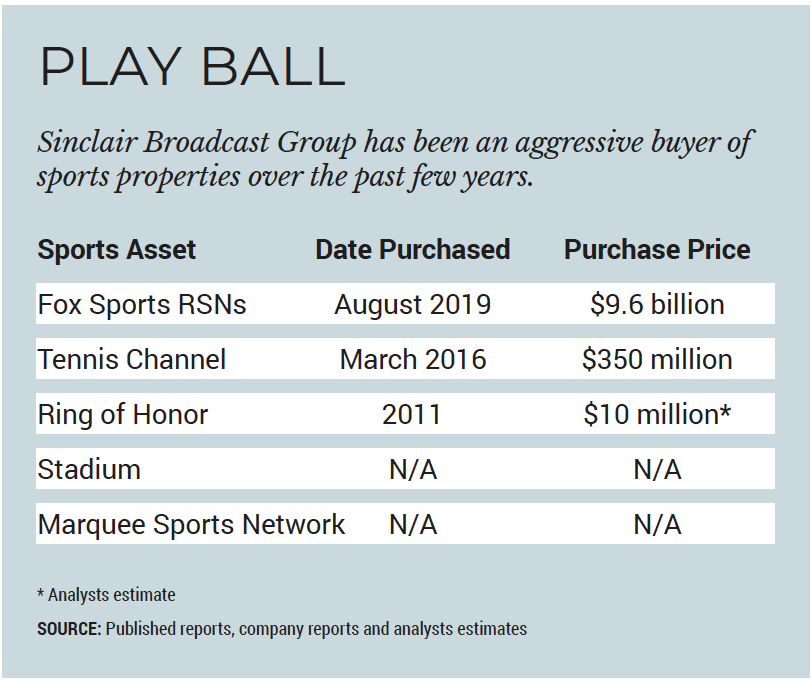Why Sinclair’s Sports Bet Is a Risky Play
The smarter way to stay on top of the multichannel video marketplace. Sign up below.
You are now subscribed
Your newsletter sign-up was successful
Three months after winning the bidding for the 21 Fox Regional Sports Networks from The Walt Disney Co., Sinclair Broadcast Group could face some major pushback from a key distributor for the channels, Comcast.
Concerns about the RSNs — typically among the highest priced in the industry — has weighed on the broadcaster’s stock, which is down nearly 20%, to $35.84 per share from $44.39, since it closed the RSN deal in August.

Sinclair’s $9.6 billion bid topped that of Liberty Media chairman John Malone, whose company had teamed with Major League Baseball to bid on the networks that Disney was forced to divest after its acquisition of 21st Century Fox’s cable and studio assets. Another bidder was rapper Ice Cube, whose Big3 Networks had planned the channels to bolster its professional three-on-three basketball league.
Sinclair acquired 21 former Fox RSNs, in markets including Detroit, Miami and Cleveland.
Sinclair also is a minority partner in the YES Network, a separate, New York City-area network that was formerly in the Fox RSN stable and was purchased in August by the New York Yankees and Amazon.
So far, Sinclair has managed to reach deals for carriage of the RSNs from key distributors, including Charter Communications in July, Cox Communications in August and AT&T and Mediacom Communications in October. But in July, Dish Network dropped the channels, complaining of high prices.
Comcast’s carriage agreement with Sinclair for stations and channels expires in June 2020. The cable operator has expressed concern over the high costs of sports programming and recently went to the mattresses with another regional sports network, Denver’s Altitude Sports.
The smarter way to stay on top of the multichannel video marketplace. Sign up below.
Rocky Mountain Row
Altitude, which televises Denver Nuggets and Colorado Avalanche games, went dark to the cable operator in August. In late November, Altitude sued Comcast in U.S. District Court in Colorado, claiming the cable operator, after carrying the network on its expanded basic tier for 15 years, insisted Altitude be moved to a higher-priced sports tier and accept a lower fee. That, Altitude said in court documents, would drive the channel out of business.
Comcast has said the suit is without merit.
Tiering sports networks, especially pricey ones like the Fox Sports RSNs (which can cost as much as $6 per subscriber per month), could become more common. Distributors looking to keep costs down as more and more consumers cut the pay TV cord (the pay TV business lost about 3.8% of its customer base in Q3) are increasingly looking at sports channels. RSNs are often considered to be must-have programming, but some distributors are finding that missing them doesn’t necessarily have that much of a negative impact. Case in point: satellite-TV provider Dish Network’s decision to drop the Fox RSNs in July over pricing concerns.
RELATED: Sinclair, Chicago Cubs Will Launch RSN
About 5 million of Dish’s 12 million total subscribers get the Fox RSNs, and in Q3 the two-month blackout had little impact on results: total TV subscribers were up by 138,000 in the period, compared to a loss of 341,000 customers in the prior year. While that was mainly due to increases at its streaming service Sling TV, the satellite service lost just 66,000 customers in the period (compared to a loss of 367,000 a year ago) prompting some to see it as a sign that cord-cutting at the satellite giant may be slowing.
Evercore ISI Group media analyst David Joyce reduced his 12-month price target on Sinclair stock on Nov. 21 to $40 per share from $50 “due to the ongoing absence of a key distributor of the company’s regional sports networks.”
In a note to clients, Joyce estimated that without a major agreement, the $1.3 billion in RSN cash flow he was expecting for 2019 will drop to just over $1 billion in 2020.
In an email message, Joyce said Ever-core’s estimates don’t anticipate another Dish-like distributor drop, but added that “with cord-cutting and cord-shaving impacting the tiers in which the RSNs reside more so than the rest of the industry, we see (6)% subscriber declines while the sports rights continue to grow with contractual escalators.”
In the research note, ISI looked at both the bull and bear case scenarios for the networks. “We think there is a risk in that bear case that there could be further re-tiering of the RSNs or price reductions,” Joyce said in the email.
While the Comcast negotiations are months away, the Dish battle is ongoing. Early in the fight, Dish chairman Charlie Ergen said it is very likely the Fox RSNs would never return to the satellite giant. Ergen similarly opined that Univision channels might never return after getting dropped in 2018, before restoring them under a new contract in March 2019.
Based on Dish’s Q3 results, though, the case for keeping the regional sports networks off only gets stronger with time.
The biggest impact of the Dish blackout so far seems to be it resulted in Sinclair having to pay Disney less for the Fox RSNs. On a conference call with analysts to discuss Q3 results, Sinclair CEO Chris Ripley said as part of the RSN purchase, there was a purchase price reduction of about $400 million “related to potentially protracted negotiations with Dish.”
Ripley: We’re Not Worried
Ripley said on the call that Sinclair considers the Dish stalemate a “temporary issue” and that he is confident of the RSNs’ value proposition. Viewership, he said, is greater than the top 10 entertainment programs combined, and hopefully the satellite TV service will recognize that value over time. If not, Ripley isn’t sure if Dish, which has lost more than 1.3 million satellite-TV subscribers over the past seven quarters, is in a position to matter much.
“Either we come to a deal with Dish or their relevance in the industry will be reduced over time,” Ripley said on the call.
Sinclair has gone all in with sports in the past few years: it bought Tennis Channel in 2016 and wrestling promotion Ring of Honor in 2011. In 2017, Sinclair created Stadium, a joint venture focused on college sports and professional highlights. This year, Sinclair formed Marquee Sports Network with the Chicago Cubs, planning to launch in the 2020 baseball season. According to Sinclair’s Ripley, with the inclusion of the Fox RSNs, more than 70% of the company’s revenue will be derived from distribution fees.

While that has helped the broadcaster rely less on the increasingly volatile advertising market, it also has placed a huge burden on Sinclair’s ability to attract and maintain high carriage fees for its networks.
“There’s a feeling that maybe RSNs aren’t as much a ‘must have’ for viewers as was once thought,” TV [R]ev co-founder and lead analyst Alan Wolk said, noting that even as Dish did lose about 66,000 subscribers, it was nowhere near the 1.4 million that AT&T shed in the quarter.
“Given the number of games that MLB, NBA and NHL teams play, it seems increasingly difficult for fans to watch most of them,” Wolk continued. “Add in the fact that they can check scores in real time online, and see highlights online as well in close to real time, the need may indeed be diminishing.”
Liberty’s Malone, during a Q&A session at its annual Investor Day in New York Nov. 21, said pundits should not to read too much into the Dish numbers in relation to the Sinclair blackout.
“A substantial part of his [Charlie Ergen’s] base doesn’t have a choice,” Malone said at the Investor Day. “That’s less intense than somebody that has three or four immediate competitors in a local market. It’s a tougher call.”
Malone: Tiering Could Prove Painful
If the inability to secure proper carriage for the RSNs led to the insolvency of Diamond Sports, the Sinclair subsidiary that owns the sports channels, Malone joked, it “would break my heart.” But the perception that distributors are getting fed up with pricey sports channels is becoming a dilemma throughout the industry. Live sports and news are the two main drivers for linear video viewership and advertising, but for some distributors the cost is just too high.

Malone said that Liberty’s Fox RSN bid was “a little more rational” and didn’t tie carriage of the networks to other properties like broadcast stations’ retransmission, which he said has helped accelerate the decline of the overall programming bundle. Sports rights, he said, have been a major factor in driving the cost of the bundle beyond many consumers’ budgets.
“If you didn’t have that component, there would be far [less] cord-cutting for economics,” Malone said.
Malone said eventually sports programming, because of escalating costs, will have to be placed on premium tiers.
“That’s a process that will take years,” Malone said of the transition of major dollar sports rights to premium tiers. “In a world where [sports programmers are] extracting multiples of their fair value from the distribution system, they’re not going to voluntarily go that route. This is going to be painful and it’s going to take years.”
